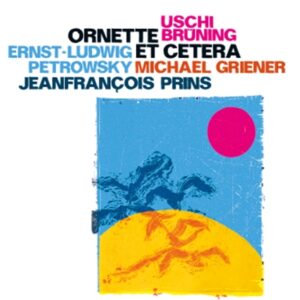CD jw 115 BRÜNING / PETROWSKY / PRINS / GRIENER
ORNETTE ET CETERA
USCHI BRÜNING voice
ERNST-LUDWIG PETROWSKY alto saxophone, clarinet & flute
JEANFRANÇOIS PRINS guitar
MICHAEL GRIENER drums
DE
DER GRÜNDLICHSTE WEG, EIN VORBILD ZU VERFEHLEN, BESTEHT DARIN, ES ZU IMITIEREN.
Hier aber wird die Musik von Ornette umspielt und assoziiert, ergänzt durch eigene Spontankompositionen, niemals nachgeahmt. Aus dem Fundus von Ornette Coleman zu schöpfen bedeutet, aus dem Fundus der Freiheit zu schöpfen. Das Et cetera wird nicht zur Floskel, sondern zum Bestandteil des Wesentlichen: im Übrigen, und so fort, eines fließt aus dem anderen. Musik aus dem Geist von Coleman weist über Ornette hinaus. Seine Kompositionen sind allenfalls Startrampen für die von ihm rhetorisch gestellte Frage „Was spielt man, wenn man das Thema gespielt hat?“
Dieses exzeptionelle Quartett beflügelt sich nicht nur bei dessen Hommage à Ornette, sondern auch und vor allem beim Et cetera. Als Union of Sounds fliegen die Vier durch den Raum, ganz im Sinne von OC, der einmal sagte: „Es ist möglich, unisono zu spielen, auch wenn jeder eine andere Tonart intoniert.“ Das Quartett folgt seinem Leitbild in der Perfektion des Unperfekten, in der Sinngebung des Zufälligen, in der Intuition, mit der die individuellen Stimmen etwas Gemeinsames gestalten: eine Art mobile Architektur.
Auch der Ort, an dem die Aufnahmen zu dieser CD entstanden, lässt neuere Jazzgeschichte aufleuchten. Das Ernst-Ludwig Petrowsky jahrzehntelang vertraute Studio im Komplex des ehemaligen DDR-Rundfunks – eine Insel, eine Klangkapsel inmitten des Verfalls – inspirierte die Aufnahmesessions. In kürzester Zeit wurde das Gültige dem Moment abgetrotzt. Bert Noglik
EN
THE BEST WAY OF FAILING TO EMULATE A ROLE MODEL IS TO IMITATE IT.
But on this album there are allusions and associations with Ornette’s music as well as spontaneous original compositions – but there are no imitations. Drawing on the resources of Ornette Coleman is tantamount to drawing on the resources of freedom: Here an et cetera is not a cliché, but a crucial part of the whole – and so on, and so forth, one thing leads to another. Music in the spirit of Coleman goes far beyond Ornette. His compositions are nothing more than springboards for his rhetorical question: „What do you play when you have already played the theme?“
This exceptional quartet is not only inspired at the Hommage à Ornette – also, and above all, in Et cetera. As a union of sounds the four fly through space in the true tradition of OC, who once said: „It is possible to play in unison even if everyone is playing in a different key.“ The quartet follows his lead in the perfection of the imperfect, in giving meaning to the coincidental, in the intuitive knowledge with which the individual voices create something they all hold in common. It is a kind of mobile architecture.
Even the location of this CD recording sheds light on recent jazz history. The recording sessions were inspired by a studio in the grounds of the former East German broadcasting corporation – a place intimately familiar to Ernst-Ludwig Petrowksy as an island, a sound capsule in the midst of decline. Bert Noglik

